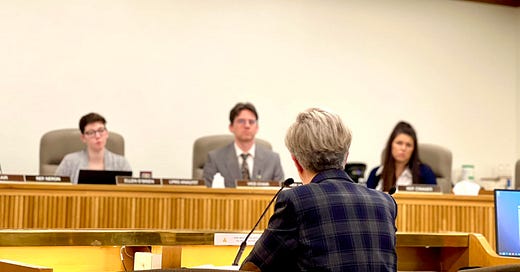The Liftoff: Who got a $200,000 bonus?
PLUS: Kotek's approval rating; UO's new president; Oregon's connection to the "trillion dollar coin" idea; the devastation of fentanyl; high profile bills in the state legislature; and more!
Welcome back to The Liftoff!
We had our most views ever last week, and we can’t thank you enough for joining us on this ride. Our goal continues to be to send you relevant information about everything happening in Oregon news, politics and government. Your continued support and subscriptions allow us to keep it up.
We are looking for a full-time content director. Email Alex (alex@or360.org) a copy of your resume if interested!
Also, if you are interested in writing an op-ed for The Oregon Way, please be in touch! We welcome all voices and perspectives.
1. Mental health and addiction are front and center in Oregon politics
The rate of Oregon teenagers killed by overdose is growing faster than any other state, according to Willamette Week and The Lund Report. The article does not mince words about the state’s inaction to the growing problem:
“As a result of state officials’ long-standing failure to respond to youth drug addiction, fentanyl—the potent opioid that’s driving the skyrocketing death toll—has dealt Oregon a particularly devastating blow.”
Must Listen: OPB’s Amelia Templeton aired four stories last week about “the gaping holes in the state’s mental health system, including the rising challenge of addiction and the lack of services for people struggling with drugs and alcohol.” She breaks down different problems including lack of funding, detox beds and more.
Tuesday: Experts around Oregon discuss their biggest challenges—and promising strategies—around Oregon’s mental illness and substance abuse crisis.
Wednesday: A look at alcohol’s impact in Oregon—and the lack of detox centers and other beds available. On average, six people die each day in Oregon from alcohol related causes.
Thursday: A look at Oregon’s lack of treatment and housing options for people experiencing mental illness. Templeton reports, “People with serious mental illnesses often receive treatment for a time and then drop out or discontinue it.”
Friday: A deeper look at Oregon’s mental health system, and the unique problems facing rural Oregon. “Rural communities have higher rates of so-called ‘deaths of despair,’ like overdoses, alcohol related deaths and suicides, than the more urban parts of the state.”
2. The legislature’s $200 million gamble and big bills this week
The Oregon legislature moved forward on two very different pieces of $200 million legislation:
Housing: The Oregon House passed the Governors $200 million budget request to address housing and homelessness.
Next up? A vote in the Oregon Senate this week (possibly Tuesday or Wednesday), and then Governor Kotek is expected to sign the legislation.
Oregon CHIPS Act: Following eight weeks of hearings, the bill passed out of the Legislature’s Joint Semiconductor Committee on Wednesday with broad bipartisan support. According to the Capital Chronicle, “Senate Bill 4…would create a $200 million fund for grants and loans for businesses seeking federal funding to expand in Oregon.”
OPB provides more context: “The second, and more controversial, provision would grant Kotek the unprecedented authority to unilaterally bring land within the ‘urban growth boundaries,’ known in government-parlance as UGBs, that envelop Oregon cities, separating protected rural land from areas that can be developed.”
Bills to watch this week:
Abortion and Gender Affirming Healthcare (HB 2002): In a preview piece ahead of a hearing on Monday on expanding access to reproductive health care and gender affirming healthcare, the Statesman Journal writes, “While many states are proposing legislation that would limit or completely block access to these types of care, advocates and legislators in Oregon hope to pass HB 2002, which would protect and decrease gaps in access to reproductive and gender affirming healthcare.”
Gun Violence: Oregon lawmakers are pursuing a package of firearm bills aimed at preventing gun violence and banning untraceable “ghost” guns. According to a preview piece in the Oregon Capital Chronicle ahead of Wednesday’s hearing:
House Bill 2005 would punish the manufacturing, sale, and possession of undetectable firearms intended to skirt security screenings and untraceable firearms that lack a serial number.
House Bill 2006 would increase from 18 to 21 the legal age to purchase or possess a firearm. The proposal would have exceptions for firearms used for hunting and for people younger than 21 who are in the military or police officers.
House Bill 2007 would allow cities and counties to restrict people licensed to carry a concealed handgun from possessing a firearm on the agency’s buildings or grounds.
3. Professor Rohan Grey is an Oregonian making waves in Washington and on Wall Street
Professor Rohan Grey is an Oregonian making waves in Washington and Wall Street—all from his office at Willamette Law School. A professor of economics and financial regulation, Grey is one of the leading proponents of the "mint the coin" theory which advocates that the US government mint a trillion dollar coin to stop a potential default in Washington.
Grey also discusses his fascinating career background, his theory behind money and the creation of it, and a lot more in this episode. Here's a link to a New York Times article discussing further about some of Grey's beliefs and the coin theory.
4. Sponsored Message from Harrang Long P.C.: Harrang Long’s Appellate Practice
Few law firms in Oregon match the experience and expertise of Harrang Long P.C.’s appellate practice group. Three of our lawyers have been named in The Best Lawyers in America© for appellate law, and one of our lawyers has been named in The Best Lawyers in America: Ones to Watch© for appellate law, demonstrating the breadth and depth of our team. Our group includes two former Solicitors General for the State of Oregon, who were responsible for all of the state’s appeals, including appeals to the United States Supreme Court. Those lawyers, William F. Gary and James E. Mountain, Jr., also are members of the American Academy of Appellate Lawyers.
Collectively, our team has handled thousands of appeals before state and federal courts, including civil appeals resulting in precedent-setting decisions on business, constitutional, and public policy issues. We represent clients in appeals from trial court decisions and administrative orders, as well as initiative ballot title challenges. To learn more about Harrang Long’s Appellate Practice Group, click here.
5. A $200,000 bonus, Kotek’s polling, and more news from Salem
Now that’s a big bonus: From Les Zaitz in the Salem Reporter: “The board of Salem-based SAIF Corp. has awarded a $200,000 bonus to the company’s president, aiming to shift compensation more in line with other insurers around the U.S. Chip Terhune, who became SAIF president in July 2021, also got a 4% pay raise. That moves his base salary up to $540,800 and added a bonus for 2022 work of $223,333. With the combined compensation of $764,133, Terhune makes about seven times what is paid to Gov. Tina Kotek.”
No such thing as a free lunch. Legislation to provide free meals for public school students in Oregon, regardless of income level, has stalled in the legislature according to The Oregonian. Instead, the legislature will pursue a task force.
Kotek underwater: According to the Oregonian (and DHM Research): “Fully 43% of respondents said they had a negative view of Kotek, while just over a third said they had a very or somewhat positive view of the Democratic governor, according to the online survey of 500 Oregon residents selected to match the demographic profile of the state’s adult population.”
Jewish culture, history, and contributions would be apart of Oregon’s curriculum under HB 2905. OPB reports the bill would complement existing requirements for Oregon’s schools to teach about BIPOC, LGBTQ and immigrant communities.
Who will certify the mushroom trainers? Last week, we reported that Synthesis Institute, a psilocybin training center in Ashland, abruptly closed. Willamette Week writes that the programs are governed by both the Oregon Health Authority, and the Higher Education Coordinating Commission—and the closure of the program puts a big spotlight on the two regulators.
Veteran Salem reporter Dick Hughes writes in the Oregon Capital Insider about the relationship this session between Republican and Democrats, including Senate Republicans insisting that bills be read word-for-word before voting.
Oregon Secretary of State Shemia Fagan released a pay equity analysis that showed people of color earned less in 2022 compared to white men in 2015. “In both years, women working for the state earned 83 cents in base pay compared to $1 for white men,” writes The Capital Chronicle.
From the SOS’s report: “Our analysis shows more must be done to close persistent wage gaps for women and people of color.”
Oregon’s Clean Vehicle Rebate Program is out of cash: The Oregon Department of Environmental Quality is suspending the Clean Vehicle Rebate Program for a year because the program is running out of money.
The Oregonian reports there are now over 60,600 electric vehicles registered in the state.
6. Metro Area News: Childcare grants, homeless camp fires, and eyebrow-raising contributions
Beaverton Mayor Lacey Beaty proposes providing matching grants to childcare centers that expand their operations in Beaverton. “I and the city believe that child care is infrastructure. We really see this as economic development in our community,” Beaty told OPB.
The Portland City Council adopted code changes to make office-to-housing conversions more feasible. The Portland Business Journal writes “the approvals followed months of discussions…But while they backed the changes, developers pushed for further deregulation.”
Fires at Homeless Camps were 41% of all fires in Portland last year. According to WW, unreported data from the fire bureau shows that in 2022 there were 1,959 “homeless-related fires.”
The Oregonian’s Noelle Crombie reports that an internal memo from the Multnomah County DA’s office shows that 1 in 5 alleged impaired driving cases referred to the DA can not be prosecuted because the Portland Police Bureau did not properly investigate.
The race to serve the rest of Multnomah County Chair Jessica Vega Pederson’s seat has heated up, reports WW’s Nigel Jaquiss. The contest is between community activists Ana del Rocio and Albert Kaufman and Portland Public Schools board member Julia Brim-Edwards.
Jaquiss writes: “Two of the names on del Rocio’s contributor list are noteworthy. One is PPS board chair Andrew Scott, for $250, a snub to his colleague Brim-Edwards…. Meanwhile, Metro Council President Lynn Peterson…has given $250 to del Rocio, perhaps a legacy of Brim-Edwards’ active role in helping her then-employer, Nike, submarine a multibillion-dollar transportation measure Peterson championed in 2020.”
7. News Roundup: UO’s new president, Blazers’ new mascot, and where the students went
After a six month search, the University of Oregon hired John Karl Scholz, a provost at the University of Wisconsin-Madison, as the new UO President.
Bigfoot with a beanie is the Portland Trail Blazers new 2nd mascot, and he goes by the name “Douglas Fur”. We can’t make this up!
Oregon’s public schools have lost students, writes The Oregonian. The state has lost 30,000 students—or 5%—the second highest in the country. Only Mississippi lost a larger share.
From Willamette Week: “In Its 25th Year, Death With Dignity Act Sees Record Usage”
From the Oregonian: “National Education Association picks Portland for national convention, the city’s biggest ever”
From OPB: “Portland Audubon drops the Audubon because of association with racism”
Malheur County is now on the list of counties included in Oregon's homelessness state of emergency, Governor Kotek announced Friday.
Thank you for reading.
Tips? Feedback? Ideas? Corrections? We want to hear from you! Email benjaminwbowman@gmail.com or kristinaedmunson@gmail.com.
If you value this newsletter, please become a paying subscriber today. Your support will help us grow and offer more opportunities to this community. It’s just $10 a month!
Interested in advertising with us? Get in touch! Our readership has grown significantly!
About the Authors
Ben Bowman is the state representative for Oregon House District 25 (Tigard, Metzger, and South Beaverton) and a member of the Tigard-Tualatin School Board. In his day job, he works as an administrator for a public school district. Previously, he worked as a legislative aide for former Reps. Margaret Doherty and Val Hoyle. He also co-hosts The Oregon Bridge podcast. In the newsletter and podcast, he speaks only for himself.
Alex Titus is a small business owner and consultant to businesses, nonprofits, and associations. Previously, he served as an Advisor in the Trump Administration and as a Policy Advisor to President Trump’s Super PAC. His writing has appeared in National Review, Fox News, The Hill, RealClearPolitics, and other publications.
Kristina Edmunson has been everything from press assistant for Governor Kulongoski, media advance associate for Vice President Joe Biden, and communications director for Attorney General Rosenblum. Born and raised in Eugene, she has been involved in some of the biggest and most controversial policy and legal decisions in Oregon over the last decade. She speaks only for herself in her contributions to The Liftoff.












Plus trump writer, sorry no.
Would subscribe but 110 a year is twice what NYT is, that is just impossible.